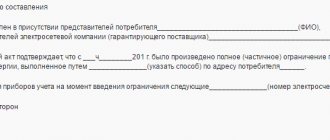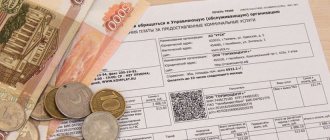Source: RosKvartal® - Internet service No. 1 for management organizations
According to the Russian Federation Regulation No. 354 dated May 6, 2011, the provision of utility services is the supply to consumers of any utility resource individually or 2 or more of them in any combination to ensure favorable and safe conditions of use residential, non-residential premises, common property in apartment buildings. The utility service also includes municipal solid waste (MSW) management services.
Utility resources are those used for the provision of public services and consumed during the maintenance of objects in the apartment building:
- cold water
- hot water
- Electric Energy
- gas
- thermal energy
- coolant in the form of hot water in open heating systems (hot water supply)
- domestic gas in cylinders
- solid fuel in the presence of stove heating
Wastewater is also considered a municipal resource.
Utility payment period
As noted above, payment for housing and communal services is carried out on the basis of payment documents provided by the contractor. They are compiled using data from metering devices installed in residential premises or houses.
Payment deadlines are established:
- based on the current requirements of legislative acts, namely Article 155 of the Housing Code of the Russian Federation and Article 66 of the Resolution of the Russian Government. They prescribe the need for a citizen to pay fees for the provision of housing and communal services no later than the 10th day of the month following the reporting month;
- on the basis of an agreement valid between the citizen and the provider of housing and communal services. Contractual terms may differ from those specified in the regulations above. In most cases, they are longer than those established by the Housing Code of the Russian Federation and the Decree of the Russian Government.
In case of failure to comply with the payment deadlines specified in the contract for the provision of one or another housing and communal services, the legislation provides for quite serious penalties. Their size is 1/300 of the refinancing rate established by the Central Bank of the Russian Federation. In case of partial payment, the amount of the remaining debt is taken into account in calculating the penalty.
New rules for paying for housing and communal services: who will pay more?
Since the New Year, the rules regarding payment for housing and communal services have changed in Russia. In addition, the relaxations introduced due to the coronavirus pandemic will be cancelled, reports Parlamentskaya Gazeta. What everyone needs to know about - more details in the material.
Penalties and fines for debtors
Fines and penalties were not assessed for debtors from April 2 to December 31, 2021. Starting from the new year, you will have to pay off your debts as before. Thus, from January 1, 2021, a penalty may be demanded for debts that arose before April 6 of the outgoing year. And if the debt arose during the “freezing” period, citizens can repay the debt, but penalties will be accrued only from the 31st day of delay.
However, some experts suggest there is a chance that the moratorium will be extended. The fact is that 30% of citizens accumulated debts during the pandemic.
Utility prices
Tariffs for housing and communal services will be increased only from July 1. Moreover, the authorities have set maximum tariff growth indices - they differ in different regions. Thus, in St. Petersburg the limit is set at 3.5%, in the Moscow region - at 3.6%, in Moscow - at 4.6%.
Please note that on January 1, prices for maintenance, repairs and rental housing will rise in Moscow. Information about this is contained on the official website of the mayor of the capital. Thus, citizens will have to pay 3.5% more for the use of residential premises, 4.6% more for maintenance, and 3.5% more for the minimum contribution for major repairs.
Checking counters
Residents of Russia need to prepare to check their meters, since previously, from April 6, a moratorium on checking was established. It will be valid until December 31. It is noted that until April next year, fees for services will be calculated based on the average meter readings for the last six months. If you do not check, then the fee will be charged according to the standard, taking into account the increased coefficient of 1.5.
Registration of rent subsidies
From January 1, there will be no need to submit documents to social security authorities indicating that there are no debts on utility bills. They must themselves check the presence or absence of utility debt through the GIS housing and communal services information system. It must be remembered that the right to a subsidy is canceled if there are debts. Let us remind you that large families, disabled people and veterans have rent benefits. A subsidy for utility bills is provided to families whose income is spent more than 22% on utility bills.
Confirmation of payment of utilities
In recent years, various systems using online services, various bank cards and virtual wallets are increasingly used when making payments for housing and communal services. In this case, conflicts and controversial situations often arise between the organization that provides services and the citizen receiving them. This becomes possible if one of the parties makes an error either when making a deposit or when processing a payment.
In order to avoid possible conflict situations, it is necessary:
- When paying for utility bills in cash, always keep all supporting documents. In this case, as a rule, there are no problems with proving the execution of the payment;
- When using various payment systems, bank cards, ATMs or electronic wallets, you should carefully follow the instructions for their use. Most systems provide a citizen with the opportunity to print out receipts confirming the deposit of funds and containing all the necessary details for proof.
It should be understood that if the situation is brought to court, it will be extremely difficult to cope without the help of a qualified and practicing lawyer. Therefore, you should always promptly check the progress of the payment and reconcile with housing and utility service providers as often as possible.
Direct payments ≠ direct contracts
In the Decision of 05.05.2014 No. AKPI14-197, the Supreme Court came to the conclusion that the establishment by a decision of the general meeting of the procedure for paying fees for utility services means the establishment of a new method of fulfilling obligations by consumers of utility services to the contractor represented by the management company, partnership or cooperative under an agreement containing provisions about the provision of such services.
In other words, the so-called direct payments are only a special way of fulfilling the obligation of the owners of premises to the provider of utility services, while the obligation itself remains unchanged. Therefore, obviously, the decision by the owners of the premises to pay for consumed utility resources directly to RSO does not relieve the management company, as the provider of utility services, of the obligation to conclude resource supply agreements (Determination of the Armed Forces of the Russian Federation dated July 6, 2015 in case No. 310-KG14-8259, A68-1080/ 2014). That is why the obligation between the RSO and the management company (HOA) also remains unchanged. This means that the manager of the apartment building is responsible to the RSO for proper payment for the utility resource supplied to the apartment building. If the court refuses to collect the debt from the manager for the resource supplied to the house, this will mean recognizing the owners of the premises as subscribers of the RSO, which in this case acts in relation to citizens as a service provider, which is generally impossible when choosing a management method in the form of a management company, Homeowners' association, residential complex (see Resolution of the Presidium of the Supreme Arbitration Court of the Russian Federation dated September 24, 2013 No. 5614/13). Therefore, the courts satisfy the claims of the RSO for the collection of debt from the management company (HOA) for a utility resource minus the amounts received from consumers (decrees of the Supreme Court of the Russian Federation dated December 25, 2014 No. 308-ES14-7187, dated August 29, 2014 No. 303-ES14-525, resolutions AS PO dated January 28, 2015 No. F06-19378/2013, AS UO dated July 22, 2015 No. F09-4294/15, AS TsO dated May 22, 2015 No. F10-786/2015).
Thus, this payment option does not allow achieving the goal of withdrawing from the provision of utility services. On the contrary, removing cash flows from the authority of the MKD manager can lead to unexpected consequences.
Checking utility bills
There are several main ways to check whether you have a debt or whether payments have been made for various utility services. The most traditional method - a direct visit or telephone call to the service provider - is increasingly rare. This is not surprising, since it is time-consuming and quite inconvenient from the point of view of obtaining clear and timely information.
In recent years, various Internet systems have been increasingly used. Their number is constantly increasing. Therefore, experts in the field of information technology recommend that citizens work with the most proven and proven resources. Moreover, these can be both the sites of the housing and communal services providers themselves, as well as specialized organizations that offer the possibility of paying for them - banks, intermediaries, etc.
In Moscow, the most popular system is the Unified Payment Document (UPD), provided by the official portal of Moscow city services. It contains information about all types of housing and utility payments that a citizen is required to make. Considering the success of this system, it is likely that similar portals will be created for other regions of Russia.
Photo No. 2. ENP website
Who issues payment documents?
Taking into account the fact that the manager of an apartment building retains the status of a provider of utility services, he is subject to paragraphs.
“d” clause 31 of the Rules for the provision of utility services, according to which it is the contractor who is obliged to calculate the amount of payment for utility services. Therefore, in legal proceedings, the subject of which is the conclusion of resource supply agreements, subject to the adoption by the general meeting of owners of the premises of a decision to pay for utilities directly to the RSO, the court accepts approximately the following wording of the terms of the agreement: the provider of utilities indicates in the payment documents submitted to the owners, tenants of the premises in MKD no later than the 1st day of the month following the settlement month, RSO details (see Resolution of the Second Arbitration Court of Appeal dated July 23, 2015 in case No. A17-7605/2014). In a situation where simultaneously the management company and the RSO issue payment documents for utility bills, the court will be on the side of the management company. In particular, the AS ZSO supported the state housing supervision body, which issued the RSO an order to stop issuing payment documents to the owners of the premises, since the executor of utilities is the Criminal Code (Resolution dated July 20, 2015 No. F04-18454/2015[1]). The arbitrators believe that if we recognize the right of RSO to issue bills to the owners of premises for payment of utilities consumed in residential premises, this will mean that the owners of the premises are subscribers of RSO, which is only possible with direct management of the house (Resolution dated June 19, 2015 No. F04- 19819/2015).
However, there is a legitimate way to transfer to RSO the right to charge fees and issue payment documents - to conclude an agency agreement with it or to include a corresponding condition in the resource supply agreement (RSO will actually perform the functions of a payment and settlement center), and it is important that the manager of the apartment building does not lose the status of the executor utilities (Resolution of AS UO dated February 10, 2015 No. F09-9088/14).
Special opinion
A completely special view of the problem presented was formed in the Far Eastern District. Firstly, the court found it completely legal for the situation in which, by decision of the general meeting, the owners of the premises paid payments (including for utilities to the ODN) directly to the RSO, and the latter, acting on the basis of the decision of the general meeting and the resource supply agreement, kept personal accounts, issued payment documents to the owners of the premises. Based on these introductory information, the court declared illegal the order of the Criminal Code to issue receipts for payment of utility services (Resolution No. F03-2379/2015 dated June 25, 2015). Secondly, the court considered that, subject to the general meeting making a decision to switch to direct payments, the RSO should collect debts for utilities from the owners of the premises, and not from the manager of the apartment building (Resolution dated 04/06/2015 No. F03-950/2015). It appears that this approach runs counter to the provisions of housing legislation.








